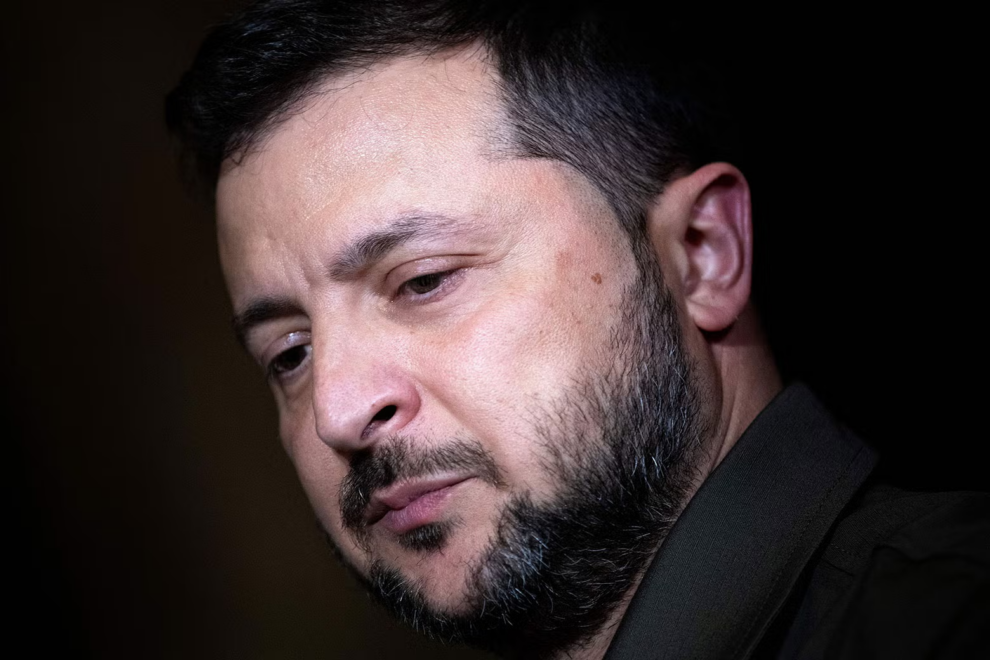In a tense game of chicken, remarkable for its mix of petulance and audacity, congressional Republicans are threatening to halt U.S. aid to Ukraine—guaranteeing a Russian breakthrough and possible victory in that war—unless Democrats help pass a bill that all but locks down America’s Southern border.
If the impasse isn’t resolved by the end of next week, when Congress goes on recess until the new year, the Ukrainian army could run out of ammunition. President Joe Biden could resupply the arsenal from U.S. stockpiles without legislative approval, but the move would be temporary, and the signal sent—that Ukraine, and by implication other allies, can no longer count on U.S. support in a pinch—could be a holiday cork-popper for Russian President Vladimir Putin and all of our other adversaries.
In a tense game of chicken, remarkable for its mix of petulance and audacity, congressional Republicans are threatening to halt U.S. aid to Ukraine—guaranteeing a Russian breakthrough and possible victory in that war—unless Democrats help pass a bill that all but locks down America’s Southern border.
If the impasse isn’t resolved by the end of next week, when Congress goes on recess until the new year, the Ukrainian army could run out of ammunition. President Joe Biden could resupply the arsenal from U.S. stockpiles without legislative approval, but the move would be temporary, and the signal sent—that Ukraine, and by implication other allies, can no longer count on U.S. support in a pinch—could be a holiday cork-popper for Russian President Vladimir Putin and all of our other adversaries.
Biden, his aides, and some Senate Democrats decry this tactic, saying that aid to Ukraine—which a majority of lawmakers support on its own—should not be tied to a separate, domestically contentious issue. But the Republicans are only exploiting a trap that Biden himself laid.
On Oct. 20, Biden submitted to Congress an emergency budget request totaling $105.8 billion. It consisted of $61.4 billion for Ukraine, $14.3 billion for Israel (in response to Hamas’ terrorist attack not quite two weeks earlier), $2 billion for Taiwan—and $13.6 billion for enhanced security on the United States’ Southern border. This last bit was meant as a sweetener to critics who were saying that we should focus more on our own borders than on the borders of faraway lands. By combining all these measures in one package, Biden thought he could maximize the chance of getting them all passed.
But Republicans in Congress added their own twist. They disentangled Biden’s package into separate pieces and introduced a much harder-line version of U.S. border security, and demanded approval of it as a condition for more aid to Ukraine. Biden couldn’t say they were changing the game—he’d already made the Southern border part of the equation, and the Republicans were only raising the ante. (The House, meanwhile, passed a bill with the funding Biden requested for Israel, though its prospects are grimmer in the Senate, where it needs 60 votes to pass).
The gambit coincided with a growing awareness—in fact, the near-unanimous acknowledgment—that the war is not going well for Ukraine. On Nov. 1, less than two weeks after Biden submitted his package, Gen. Valery Zaluzhny, the Ukrainian army’s commander in chief, said, in an interview with the Economist, that the war with Russia had settled into a “stalemate.” This admission strengthened a growing sentiment, in Congress and among the American public, that the war isn’t worth tens of billions more of taxpayer dollars.
Ukrainian President Volodymyr Zelensky instantly denounced and disputed Zaluzhny’s remark, knowing that it could demoralize the troops and stretch the allies’ impatience. But the general, who is very popular among his troops, only confirmed—and made all but official—what had long been plain to observers. In the past year of this 20-month-long war, the battle lines have shifted back and forth by less than one-fifth of 1 percent of Ukraine’s total territory. In other words, the offensives mounted by both sides, at tremendous sacrifice in blood and treasure, have had almost no effect. Michael Kofman, a military analyst at the Carnegie Endowment for International Peace who was optimistic about Kyiv’s prospects in the first half of the war, now says Ukraine’s offensive has been a “failure.” U.S. officials privately agree.
Those who dare make predictions about this war have been hurled on a wild roller-coaster ride from the get-go. When Vladimir Putin ordered the invasion on Feb. 24, 2022, U.S. intelligence officials—who had cannily warned of the invasion—forecast that Kyiv would fall in weeks, maybe days. When Ukraine not only staved off the invaders but pushed them back, recovering more than half the land initially lost, some analysts wondered whether Ukraine might push them all the way back to the Russian border; a few boldly proclaimed Zelensky’s army would win.
This optimism was based on two assumptions. The first was that the Russian army—which was inherently ill-equipped for offensive warfare and performed even more poorly than expected in the war’s opening months—would continue to flounder and fail to adapt. The second was that the Ukrainian army—which performed brilliantly in ambush operations, thanks to guerrilla-type training and real-time U.S. intelligence—would be equally adroit at “combined-arms operations,” the art of coordinating armor, infantry, and artillery units, which are necessary to break through Russia’s defensive lines.
In fact, however, after firing one commander after another, Putin finally found some generals who learned from earlier mistakes and altered tactics. Most important, they built up deep layers of defenses, including minefields, and deployed a vast fleet of drones to monitor the frontlines and minimize Ukrainian surprises. Putin also did what some Westerners thought he would be too politically cautious to do—he mobilized the Russian population, including reservists who hadn’t shot a rifle in decades. He even recruited prisoners, promising them freedom in exchange for six months on the front. An estimated 2,000 Russian troops are dying every month along every sector of the battlefront—but Putin is managing to send as many new troops to replace them. In a contest of attrition warfare, it is hard to defeat an enemy who has a bottomless well of cannon fodder.
This being the case, many—even some who support Ukraine’s cause—doubt the wisdom of continuing the fight and wonder if it might be time to strike a truce. The problem is that Putin is more secure in his Kremlin perch than many hoped he would be by this time, and so has no incentive to negotiate. In fact, he has every reason to hold tight. If Donald Trump wins the 2024 election, Putin could reasonably hope to live his dream of capturing Kyiv—and even rolling further west. Trump’s associates have said that, in a second term, he would not only refresh relations with Putin but pull the U.S. out of NATO. Why should Putin make some compromise peace deal now when he might win the jackpot in a year’s time?
The current battle in Congress must only brighten Putin’s outlook. Earlier this week, Jake Sullivan, Biden’s national security adviser, told reporters, “Any member of Congress who does not support funding for Ukraine is voting for an outcome that will make it easier for Putin to prevail” and “will hurt democracy and help dictators.” It was a brusque, even clichéd threat—but it’s also true.
Nonetheless, Republicans see a chance to get almost everything they’ve long wanted on tightening the Southern border—and they don’t seem to be backing down, even if it means risking Ukraine’s future. The showdown could play a major role in the 2024 elections, and all the actors know this. The record number of migrants illegally crossing the border from Mexico is a big issue to many voters—much bigger than the fate of Ukraine. If Biden doesn’t give in, and if the Republicans hold tight, they could accuse the president of being soft on illegal immigration and losing Ukraine.
A key signal that the Republican leaders are standing firm and playing hardball came earlier this week when Sen. Lindsey Graham, the most hawkish of hawks, told reporters he would not go back to his home state of South Carolina and “try to explain why I helped Ukraine, Taiwan and Israel and did nothing to secure our own border,” adding, in uncharacteristic MAGA-speak, “I will help all of our allies, but we have got to help ourselves first.” Senate minority leader Mitch McConnell, who has also been among his party’s firmest supporters of aid to Ukraine, said this week that no more aid should go forth without “meaningful” strengthening of our own southern border.
The $13.6 billion that Biden requested in October for U.S. border security—just slightly less than the amount he requested for Israel—included money for 1,300 new Border Patrol agents, 375 immigration judges, 1,600 asylum officers, and 1,000 extra agents tasked with seizing shipments of fentanyl.
But the Republicans are saying that isn’t enough. Their bill would tighten the eligibility requirements for asylum-seekers, require all applicants to wait outside the country while their requests are processed, charge them fees for the processing, and order the Department of Homeland Security to resume the plans that were in place to build a border wall before Biden was inaugurated and expand the planned length of the wall from 700 to 900 miles.
White House spokesmen say some of these measures are unacceptable, though Biden says he is willing to make “significant compromises.” Senate Democrats and Republicans will hold talks this weekend on possible compromises. Both sides hope a deal can be made; the leaders, anyway, don’t want to suspend aid to Ukraine or raise doubts about the reliability of America’s commitment to allies. But sometimes in the game of chicken, both drivers keep barreling ahead; neither veers off the road; and the resulting crash is bloody.
Source: Slate










